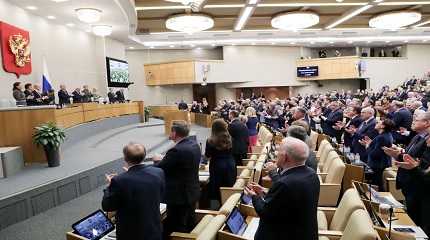
MOSCOW (AP) — Both houses of Russia’s parliament on Wednesday quickly endorsed President Vladimir Putin’s move to suspend the last remaining nuclear arms treaty with the United States, with officials and lawmakers casting it as an eleventh-hour warning to Washington amid the tensions over Ukraine.
Putin declared that Moscow was suspending its participation in the 2010 New START treaty in his state-of-the-nation address Tuesday, saying that Russia can’t accept U.S. inspections of its nuclear sites under the pact while Washington and its NATO allies have openly declared the goal of Russia’s defeat in Ukraine.
The Russian president emphasized that Moscow was not withdrawing from the pact altogether, and the Russian Foreign Ministry said the country would respect the caps on nuclear weapons set under the treaty and keep notifying the U.S. about test launches of ballistic missiles.
Dmitry Medvedev, deputy head of Russia’s Security Council that is chaired by Putin, emphasized Wednesday that the suspension of Russia’s participation in the pact was a signal to the U.S. that Moscow is ready to use nuclear weapons to protect itself.
“If the U.S. wants Russia’s defeat, we have the right to defend ourselves with any weapons, including nuclear,” Medvedev said on his messaging app channel. “Let the U.S. elites who have lost touch with reality think about what they got. If the U.S. wants Russia to be defeated, we are standing on the verge of a global conflict.”
Leonid Slutsky, the head of the foreign affairs committee in the lower house, the State Duma, emphasized that the suspension is “reversible and can be reviewed if our Western opponents come back to reason and realize their responsibility for destroying the global security system.”
Deputy Foreign Minister Sergei Ryabkov also noted that it would be up to Putin to decide whether Moscow could return to the pact. “The president will determine if and when the conditions for reviewing or clarifying yesterday’s decision emerge,” he told reporters.
Ryabkov noted that Russia’s surveillance capability will allow it to keep track of U.S. nuclear forces even without exchanges of data and inspections that were envisaged by the New START.
“We will undoubtedly follow the actions by the U.S. and its allies very closely and take further countermeasures if necessary,” Ryabkov said.




